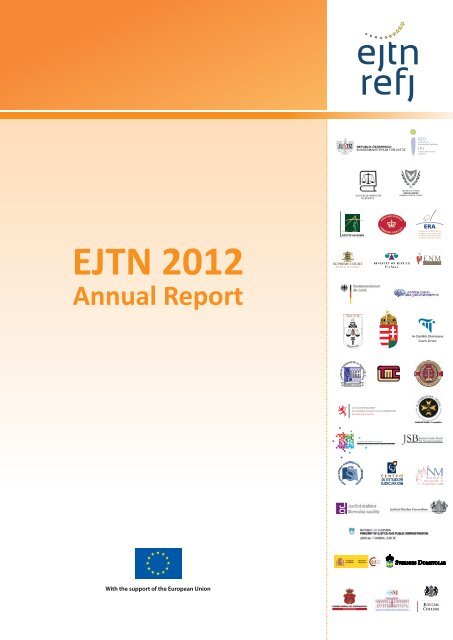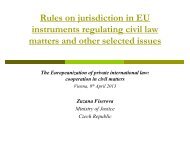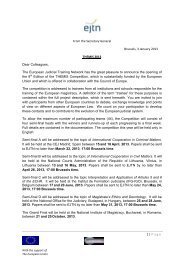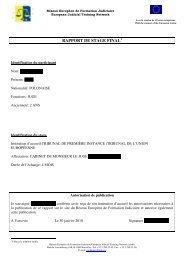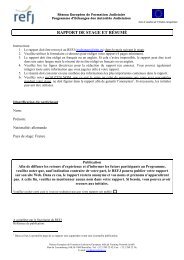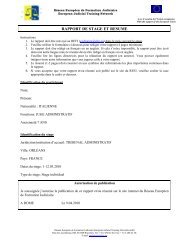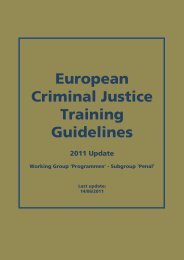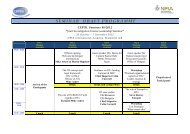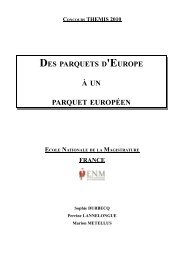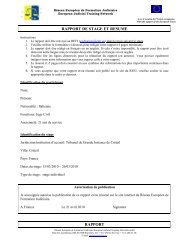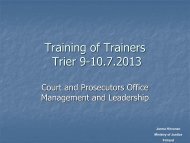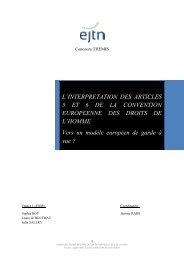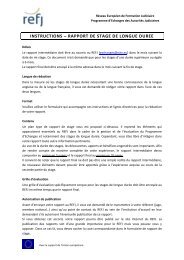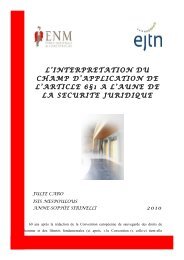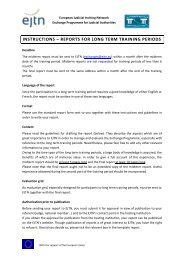EJTN 2012
EJTN 2012
EJTN 2012
- No tags were found...
You also want an ePaper? Increase the reach of your titles
YUMPU automatically turns print PDFs into web optimized ePapers that Google loves.
<strong>EJTN</strong> <strong>2012</strong>Annual ReportWith the support of the European Union
Tableof Contents3471119212731374749535961Secretary General’s IntroductionAbout <strong>EJTN</strong>History & Major MilestonesExchange Programmefor Judicial AuthoritiesCatalogueCatalogue+THEMISLinguistics ProjectCriminal Justice I &Criminal Justice II ProjectsCivil Project – CiLawTrainers’ ForumIndependent SeminarseLearning & IT InfrastructureStatistics Resume
With the support of the European UnionI am pleased, once more, to present to you the <strong>EJTN</strong> Annual Report, organised in such a wayas to provide the reader with a comprehensive overview of the <strong>EJTN</strong> projects, programmesand activities executed during <strong>2012</strong>.What becomes immediately apparent from this data is the robust growth that <strong>EJTN</strong> continuesto enjoy in terms of people served, its main reason of existence. In <strong>2012</strong>, 2413 EU judgesand public prosecutors attended <strong>EJTN</strong> training activities, representing a marked growthof 52% from the figure achieved in 2011. A similar impressive increase of 46% was reachedon what concerns the number of annual individual training days offered, with a figure thatnow stands at 51,611.Beyond these impressive numbers, probably unthinkable some years ago, <strong>EJTN</strong> strives todeliver increasing quality and innovation in all of its projects, programmes and activities.Employing a systematic approach to canvassing feedback, the added value of <strong>EJTN</strong>’sactivities becomes apparent from participants’ evaluations. Across all activities, <strong>EJTN</strong>has been consistently achieving a high or very high satisfaction rate (90–95%). This factseems to be duly justified by <strong>EJTN</strong>’s very appealing programmes, undoubtedly answeringpreviously-identified concrete training needs, and by the innovative training methodologiesdeployed. As a matter of fact, <strong>EJTN</strong>’s hands-on and simulation-based training approacheshave achieved much acclaim.I suppose <strong>EJTN</strong> members can be proud of what they have together achieved in <strong>2012</strong>.Without the commitment of all members and observers, other partners and, of course, thefull support of the European Commission, none of this could ever have become possible.A very special word of praise is also duly deserved by our extremely dedicated staff, whoseefforts were, as always, second to none in achieving these results.Very recent history, along with the reality of things, teaches us that over the coming years<strong>EJTN</strong> will continue to face several key challenges. Nevertheless, as a truly remarkableorganisation, being the only one to gather, as members, the training institutions for thejudiciary of all 27 European Union Member States and the Academy of Law, I am fullyconvinced that it will be able to surpass any of those with the same élan, determinationand ambition that has constituted the vital ingredient for its success in the recent past.May 2013Luis S. Pereira<strong>EJTN</strong> Secretary General3
About <strong>EJTN</strong>The European Judicial Training Network(<strong>EJTN</strong>) is an international not-for-profitassociation governed by the provisions ofBelgian law relating to non-profit makingassociations, foundations and non-profitmaking international associations.This association, gathering the traininginstitutions for the judiciary of all EuropeanUnion (EU) Member States has, as its aim,the promotion of training programmeswith a genuine European dimension forthe members of the European judiciary.Within the framework of the creation ofa legal area within the EU, <strong>EJTN</strong> affirmsitself as a major platform where itsMembers cooperate on the analysis andidentification of the training needs ofthe judiciaries of the Member States, theexchange and dissemination of experiencein the field of judicial training and thedesign of programmes and methods forcollaborative training. Additionally, <strong>EJTN</strong>serves as an arena for the coordinationof Members’ programmes and activitiesin matters relating to European law andthose which concern initiatives of the EUand the dissemination of knowledge aboutthe legal systems of EU Member States.In order to accomplish its tasks properly,<strong>EJTN</strong> establishes an annual programmeof activities, which is carried out by itsMembers.4
This annual programme includes activitieswhich will promote among its Membersthe comparison and exchange of judicialpractice, the understanding of thejudicial systems of Member States of theEU and the understanding of the meansof judicial cooperation within the EUas well as language skills. Furthermore,the programme may foresee support tocandidate countries with the eventualdesign and execution of trainingprogrammes with a greater Europeandimension, the development of commoninstruments of training and judicial skillsand the enhancement of judicial trainers’skills throughout the Member States.<strong>EJTN</strong> membership is available to all nationalinstitutions of the Member States of theEuropean Union specifically responsible forthe training of the professional judiciaryand for the training of prosecutors wherethey form part of the corps judiciaire. Thoseinstitutions in Member States of the EUwhich are involved in judicial training atthe EU level – particularly in communitylaw – may also be Members.<strong>EJTN</strong>’s governance and structurepromotes internal democracy,stimulates cooperation and ensuresequity amongst its Members.Governance is overseen by the GeneralAssembly, which meets annually and whereall <strong>EJTN</strong> Members take their seats.The Steering Committee, which meetsseveral times per year, is composed by amaximum of 9 elected <strong>EJTN</strong> Membersserving a period of three years. The SteeringCommittee assists and advises the GeneralAssembly President and directs the <strong>EJTN</strong>Secretary General. It may make proposalsand institute initiatives, which may benecessary between meetings of the GeneralAssembly, and which will then be referredto the General Assembly.The Secretary General, also elected to servefor a period of three years, is the head of the<strong>EJTN</strong> Secretariat, and the primary interfaceto the General Assembly and SteeringCommittee.5
History & Major Milestones1999Informal meetings heldbetween some of theheads of judicial traininginstitutions in the EU.2009Recognised as keystakeholder in furtheringEU e-Justice strategy.2007Awarded authority from theEuropean Commission for theimplementation of the annualExchange Programme for thejudiciary.2000Creation of the EuropeanJudicial Training Network(Charter of Bordeaux).2007Council’s Decision of12/02/2007 recognises <strong>EJTN</strong>as pursuing an aim of genuineEuropean interest in the fieldof training of the EU judiciary.2010Launch of <strong>EJTN</strong>’s first owntraining programmes.2003Becomes a Belgian nonprofitmaking internationalorganisation and acquireslegal status.2005Establishes a permanentSecretariat in Brussels.2008Celebrates key milestones innumber of completed judicialexchanges, in availabletraining <strong>EJTN</strong> Catalogueofferings and presents thefirst recommended judicialtraining curricula.2011Publishing of the first <strong>EJTN</strong>eLearning courses. Thenumber of annual judicialexchange participantssurpasses 1000.<strong>2012</strong>Representing continuedrobust growth, the mark of2400 participants overall wassurpassed on <strong>EJTN</strong>’s <strong>2012</strong>various training activities(excluding those of the <strong>EJTN</strong>Catalogue).7
Three dedicated Working Groups – Programmes,Exchange Programme, andTechnologies – plan and implement<strong>EJTN</strong>’s projects and programmes withintheir respective fields. Furthermore, withinWorking Programmes, five thematic Sub-Working Groups address specific projectsor issues in criminal, civil, linguistic, trainingtrainers and administrative law.The Steering Committee, the WorkingGroups and Sub-Working Groups are headedby a convener elected by their peers.While dedicated to excellence in Europeanjudicial training, <strong>EJTN</strong> works closely withthe European Commission and with nearly40 EU national judicial bodies, whichare Members and Observers of <strong>EJTN</strong>.The <strong>EJTN</strong> Secretary General, wheneverappropriate, ensures compatibility betweenthe programme of activities of <strong>EJTN</strong> andthe priorities set by the European Union.In order to plan and executeits activities, and with a viewto ensure their true Europeanadded value, <strong>EJTN</strong> relies on twomajor management concepts:decentralised planning anddecentralised execution.The decentralised planning concept meansthat every single activity to be carried outwithin the <strong>EJTN</strong> annual training programmeshould firstly be identified as correspondingto an effective training need of theEuropean judiciary by <strong>EJTN</strong> Members of theappropriate Working Group or Sub-WorkingGroup. In addition, it also signifies thatthe activity in question will be designedand structured relying on the expertiseprovided by several <strong>EJTN</strong> Members.8
The decentralised execution conceptenvisages ensuring that every single<strong>EJTN</strong> Member will be entitled to presentits candidacy to host any of the trainingactivities or any other <strong>EJTN</strong> event includedin the annual programme, if it so wishes.This concept encourages a favourablewidespread disbursement of the trainingbeing organised within the <strong>EJTN</strong> frameworkamong all EU countries.In the next pages an overview of the <strong>EJTN</strong>activities carried out in <strong>2012</strong> will be presented.<strong>EJTN</strong> is the principal platform and promoter for the training and exchange ofknowledge of the European judiciary. It represents the interests of over 150,000European judges, prosecutors and judicial trainers across Europe.Formed in 2000, <strong>EJTN</strong>’s fields of interest include EU civil, criminal and commerciallaw, linguistics and societal issues training. The vision of <strong>EJTN</strong> is to help to foster acommon legal and judicial European culture.<strong>EJTN</strong> identifies training needs and develops training standards and curricula,coordinates judicial training exchanges and programmes, disseminates trainingexpertise and know-how and promotes cooperation between EU judicial traininginstitutions.<strong>EJTN</strong>’s mandate is to help build a genuine European area of justice and topromote knowledge of the European Union legal systems, thereby enhancingthe understanding, confidence and cooperation between judges and prosecutorswithin EU states.Charged with this mandate, <strong>EJTN</strong> promotes training programmes witha genuine European dimension for members of the judiciary in Europe.<strong>EJTN</strong> is dedicated to excellence in European judicial training.9
The Exchange Programmefor Judicial AuthoritiesLaunched as an initiative of the EuropeanParliament (Resolution A5-0039/2003), theExchange Programme is a unique, handsontraining experience that allows judgesand prosecutors to directly witness thedaily work of their counterparts in differentEuropean Union countries.The Exchange Programme’s mainpurpose is to increase participants’awareness of others’ judicialsystems.The method chosen favours the developmentof a European judicial culture basedon mutual trust between judicial authoritiesbelonging to a common European judicialarea. At the same time, the Programme hasalso shown to reinforce the implementationof the principle of mutual recognition ofjudicial decisions within the EuropeanUnion.Thanks to the financial support of theEuropean Commission, <strong>EJTN</strong> has beensuccessfully implementing the ExchangeProgramme for Judicial Authorities since2005, in close cooperation with partnersall across Europe. In 2007, <strong>EJTN</strong> wasgranted a de facto monopoly position forthe implementation of these exchangesby the European Commission (DecisionE/1215/2006).Since the first Exchange Programme,approximately 4300 European judges,prosecutors and judicial trainers havebenefited from this experience. Since itsinception, the number of participantshas increased sevenfold, making <strong>2012</strong>yet another milestone as the ExchangeProgramme counted 1222 participants –representing a 28% increase as comparedto the previous year.<strong>EJTN</strong>’s Exchange Programme WorkingGroup is in charge of establishing theoverall policy applying to the executionof the Exchange Programme, in closecooperation with the national contactpoints and the <strong>EJTN</strong> Secretariat.In <strong>2012</strong>, the partners of the ExchangeProgramme were the Ministry of Justice andthe Association of Austrian AdministrativeJudges (Austria), the Judicial TrainingInstitute (Belgium), the National Instituteof Justice (Bulgaria), the Judicial Academy(Croatia), the Judicial Academy (CzechRepublic), the Danish Courts Administration(Denmark), the Supreme Court and theProsecutor’s Office (Estonia), the Ministry11
of Justice (Finland), the National Schoolfor the Judiciary and the Council of State(France), the Federal Ministry of Justice(Germany), the National School of Judges(Greece), the Judicial Academy and theOffice of the Prosecutor General (Hungary),the High Council for the Judiciary and thePresidency council of administrative justice(Italy), the Ministry of Justice (Luxembourg),the Judicial Studies Committee (Malta), theTraining and Study Centre for the Judiciary(The Netherlands), the National School ofJudiciary and Public Prosecution (Poland),the Centre for Judiciary Studies (Portugal),the National Institute of Magistracy(Romania), the Judicial Academy (Slovakia),the Ministry of Justice (Slovenia), theJudicial School and the Centre of LegalStudies (Spain), the Courts Administration(Sweden), the Judicial College of England &Wales and the Judicial Studies Committeeof Scotland (United Kingdom) along withthe Court of Justice of the European Union,the European Court of Human Rights andEurojust.In order to meet different trainingneeds, <strong>EJTN</strong> offers European judgesand prosecutors several exchangeschemes within the framework ofthe Exchange Programme.Table 1 – Number of Participants in the Exchange Programme <strong>2012</strong>per activity offeredExchange Programme ActivityNumber of participantsShort-term exchanges 630Long-term training periods 19Study visits 197Initial training 376TOTAL 1222The bulk of the Exchange Programme’sactivities consist of short-term exchangesin courts or at prosecutors’ offices. Thesecan follow a one-to-one scheme, in whichthe visiting judge or prosecutor shadowsa counterpart in their daily practice in acourt or a prosecutor’s office of the hostingcountry. They can also be organised as agroup exchange, in which several judgesor prosecutors from different countries goon the same exchange, thus increasing thecross-fertilisation aspect of the experience.Long-term exchanges are also offered forjudges (both ordinary and administrative)and prosecutors. This type of exchangeoffers the opportunity to participate inlong-term training periods at Eurojust, theCourt of Justice of the European Union andthe European Court of Human Rights, fora length varying from 3 months to 1 year.12
During the exchange, participants areassigned to the office of a national member(Eurojust), to the cabinet of the member ofthe Court (CJEU) or to the Registry (ECHR)and, thus, become acquainted with therespective work, procedures and case law(in the case of CJEU and ECHR).Alongside the short-term and long-termexchanges, one-week study visits inEuropean bodies and initial trainingexchange schemes have been introducedas of 2010.The study visits to European bodies focusedon specific thematic subjects. These havetaken place in cooperation with theEuropean Court of Human Rights (threeactivities), and with Eurojust (one activity).The latter was organised as a complementto the more extensive three-monthexchanges, in order to provide participantswith first-hand insight into the institution,its role and its activities.Furthermore, and building on the successof the previous study visits, in <strong>2012</strong> <strong>EJTN</strong>’sExchange Programme included study visitsat the Court of Justice of the European Union(four activities) into its array of activities.In total, 8 study visits were organised in<strong>2012</strong>. These activities offer the participantsthe opportunity to better understand thefunctioning of these institutions and oftheir procedures, and to reflect on andimprove their professional practice. Thestudy visits are intended to provide aforum of fruitful exchange of experienceand information between members of thejudiciary and their European counterparts.As a result, the capacity of European judgesand prosecutors to apply in their dailywork the acquis, the rights and freedomsguaranteed by the ECHR is reinforced, sothat a true European judicial culture andthe fulfilment of an area of freedom securityand justice comes even closer.13
The specific initial training exchangescheme allows future judges and prosecutorsfrom different European countries toparticipate in judicial exchanges betweentraining schools and institutions. By takingpart in this exchange scheme specificallydesigned for them, future European judgesand prosecutors have the opportunityto learn about other judicial systemsand training curricula, meet with theircounterparts and develop useful contactsfor their future professional lives. Theyencourage cooperation between theworlds of education, training and work, andprovide a forum for discussion, exchangeand learning about themes of commoninterest and about European and nationalpriorities.14
The Exchange Programme – Facts and FiguresTable 2 – The Exchange Programme <strong>2012</strong> CalendarACTIVITY DATES HOSTING INSTITUTION(S)Short-term exchanges 26/03/<strong>2012</strong>–21/12/<strong>2012</strong> Courts/prosecution officesand training institutions of23 Member StatesLong-term exchanges 26/03/<strong>2012</strong>–31/12/<strong>2012</strong> CJEU, ECHR and EurojustFirst study visit at ECHR 18–21/06/<strong>2012</strong> ECHRFirst study visit at CJEU 2–3/07/<strong>2012</strong> CJEUSecond study visit CJEU 27–28/09/<strong>2012</strong> CJEUSecond study visit ECHR 1–4/10/<strong>2012</strong> ECHRFirst series initial trainingstudy visits8–12/10/<strong>2012</strong> SSR, The NetherlandsThird study visit CJEU 17–18/10/<strong>2012</strong> CJEUSecond series initial trainingstudy visits12–17/11/<strong>2012</strong> Training institutions of 13Member StatesFourth study visit CJEU 15–16/11/<strong>2012</strong> CJEUThird series initial trainingstudy visits3–8/12/<strong>2012</strong> Training institutions of 4Member StatesThird study visit ECHR 10–13/12/<strong>2012</strong> ECHRStudy visit Eurojust 10–14/12/<strong>2012</strong> EurojustTable 3 – Exchange Programme Participants Overview1300120011001000900800700600500400300200100016920051222928667375 374 3542262006 2007 2008 2009 2010 2011 <strong>2012</strong>15
Table 4 – <strong>2012</strong> Participants Sent – Nationality breakdown250225200179150137100113771055004434 32201324179 8AT BE BG CZ DE DK EE ES FI FR EL HR HU IT LU MT NL PL PT RO SE SI SK UK331 15041620 1914Table 5 – <strong>2012</strong> Participants – Hosting18016016815714012010080604020027 3021581610179 6 13 123AT BE BG CZ DE DK EE ES FI FR EL HR HU IT LU MT NL PL PT RO SE SI SK UK7055103441026931716
Table 6 – Breakdown of <strong>2012</strong> participants per function or category8%24%9%19%40%JudgesProsecutorsAdministrative judgesTrainersFuture judges/prosecutorsThe results of the evaluations completedby participants and tutors in all activitiesof the Exchange Programme <strong>2012</strong>(including short-term exchanges forjudges, prosecutors and trainers, longtermexchanges and study visits for bothcontinuous and initial training) show thata very large majority of participants (99%)were very satisfied (84%) or satisfied (15%)with their experience. Furthermore, 99%call for the continuation of the Programmein future years.The Exchange Programme can beconsidered highly satisfactory in termsof relevance and efficiency. Indeed, itreflects the needs of beneficiaries andfits with their objectives. In the meantime,positive feedback has been receivedfrom beneficiaries on the effectivenessof the activities in terms of comparativeknowledge of different judicial systems,improving their feeling of belonging toa common judicial space and developingmutual trust.Beneficiaries have expressed furtherpositive feedback relating to the raisingof participant awareness of the ECHR, theCourt of Justice of the European Union’scase law, Eurojust and the several legalinstruments of judicial cooperation.Participant feedback reflects the success ofthe Exchange Programme and stimulates<strong>EJTN</strong>’s Exchange team and contact points tofind ways of improving and extending theExchange Programme in the future.17
CatalogueThe general Catalogue programme coversthe training activities organised by <strong>EJTN</strong>’smembers, which are open to all thejudges and prosecutors of <strong>EJTN</strong>’s memberand observer institutions. All institutionshave access to seminars organised byall of the other institutions. Through thegeneral Catalogue programme, judges andprosecutors benefit from quality trainingand expand their network of contacts.The participants in the <strong>2012</strong> Catalogueprogramme represented 14 judicialtraining institutions from across various EUMember States: the Bundesministerium FürJustiz, Austria; the Institut de FormationJudiciaire-IFJ, Instituut voor gerechtelijkeopleiding – IGO, Belgium; the JudicialAcademy, Czech Republic; the Academy ofEuropean Law (ERA), Germany; the Ministryof Justice, Finland; the French NationalSchool for the Judiciary (ENM), France;the Deutsche Richterakademie, Germany;the High Council for the Judiciary, Italy;the Studiecentrum Rechtspleging (SSR),The Netherlands; the Centro dos EstudiosJudiciários (CEJ), Portugal; the NationalInstitute of Magistracy (NIM), Romania; theCentro de Estudios Jurídicos (CEJ), Spain;the Escuela Judicial de España, Spain; andthe Judicial College, England and Wales, UK.AchievementsThe Catalogue programme has enjoyedconsistent and robust growth. In <strong>2012</strong>,252 Catalogue activities were available.Relative to the previous year, the totalnumber of national participants (thoseattending Catalogue seminars held in theirown resident states) in the <strong>2012</strong> Catalogueprogramme grew by 29.7% to 8,798.The total number of foreign participants(those attending Catalogue seminars heldoutside of their own resident states) in <strong>2012</strong>was 923. Combining both the nationalparticipants and foreign participants, thetotal number of Catalogue participantsincreased by 21.9% to 9,711 in relation tothe previous year.All information concerning the programmeis published on the <strong>EJTN</strong> website, under theCatalogue programme section.Catalogue – Facts and FiguresTable 7 – Catalogue <strong>2012</strong> breakdown of seminars by topicCombining both the nationalparticipants and foreignparticipants, the total numberof Catalogue participantsincreased by 21.9% to 9,711relative to the previous year.12% 2%10%3%38%35%Administrative LawCivil LawCriminal LawLinguisticProfessional PracticeSociety issues19
Table 8 – <strong>EJTN</strong> Catalogue <strong>2012</strong> ParticipantsCountryInstitutionTotalactivitiesLanguageNationalForeign participants repartition by EU nationalityparticipantsDE EN ES FR IT NL PL PT AT BE BG CY CZ DK EE FI FR DE EL HU IE IT LV LT LU MT NL PL PT RO SK SI ES SE UK Non-EU TOTALAustria 12 1 625 0 9 2 1 5 17Belgium 55 1 1 1481 2 0 10 2 2 2 2 2 3 2 2 2 2 3 2 2 2 2 3 3 2 4 2 2 2 2 2 2 68Czech Republic 1 1 5 1 0 2 3 2 1 9ERA 15 1 1 1 1 1 1 7 2 47 8 17 2 15 1 4 58 17 18 5 29 26 41 1 4 1 40 35 33 7 6 55 4 5 12 500Finland 1 1 10 0 0France 61 1 2325 0 4 39 1 6 1 34 1 3 89Germany 31 1 1 992 5 1 1 0 1 6 3 5 22Italy 20 1 1921 1 1 1 1 1 2 2 0 1 3 13Netherlands 12 1 177 0 0Portugal 3 1 369 0 4 4Romania 20 1 292 1 0 11 2 1 11 2 2 1 7 0 1 17 1 57Spain EJ 10 1 1 1 1 171 1 9 12 1 2 0 7 6 18 7 13 1 21 23 16 3 0 2 142Spain CEJ 3 1 1 1 48 2 0 2UK (England &Wales)9 1 382 0 0253DE EN ES FR IT NL PL PT8798AT BE BG CY CZ DK EE FI FR DE EL HU IE IT LV LT LU MT NL PL PT RO SK SI ES SE UKNon-EUparticipantsTOTAL4 7 3 6 2 2 1 1 17 12 81 11 23 6 25 3 15 91 20 29 7 64 30 46 42 6 7 74 60 67 10 13 119 7 8 30 923
Catalogue+<strong>EJTN</strong>’s Catalogue+ programme is unique inthe sense that rather than creating brandnew training activities, the programme aimsto enhance and upgrade existing trainingcourses of its membership. <strong>EJTN</strong> providesfinancial assistance to its participatingmember organisations to enhance contentand translate existing training courses.Members are free to choose any existingEU law-related courses for enhancement.In <strong>2012</strong>, <strong>EJTN</strong> offered its members theopportunity to enhance and upgrade a totalof 15 training activities within EU law. Underthe overall supervision and coordinationof the Working Group Programmes, theCatalogue+ programme successfullydelivered the 15 training activities.Under the programme, <strong>EJTN</strong> providesup to 1500 EUR for the upgrading andtranslating of the training activity toanother language decided by the hostinginstitution. Individual participants’ travelexpenses are reimbursed by <strong>EJTN</strong> up to 400EUR and they are also paid a per diem forthe duration of the activity.Each member organisation participating inthe Catalogue+ programme was given theopportunity to send 10 of its participantsto the Catalogue+ activities held by other21
<strong>EJTN</strong> members. Over <strong>2012</strong>, 15 trainingactivities, ranging from two to five days inlength, gathered 10 foreign magistrates(those resident outside the state where theactivity is held) each along with nationalones (those resident in the state where theactivity is held).In <strong>2012</strong>, 15 of <strong>EJTN</strong>’s members andpartners participated in the programme:the Centro dos Estudios Judiciários (CEJ),Portugal; the Instituut voor gerechtelijkeopleiding/Institut de Formation Judiciaire(IGO-IFJ), Belgium; the Supreme Court ofEstonia, Estonia; the Ministry of Justice,Judicial Training Centre, Slovenia; theDanish Court Administration, Denmark; theCentro de Estudios Jurídicos (CEJ), Spain;the Studiecentrum Rechtspleging (SSR),The Netherlands; the National School ofJudiciary and Public Prosecution, Poland;the Academy of European Law (ERA),Germany; the Czech Judicial Academy,Czech Republic; the National Institute ofMagistracy (NIM), Romania; the Presidentof the Higher Regional Court Innsbruck,Austria; the High Council for the Judiciary,Italy; the French National School for theJudiciary (ENM), France; and the DeutscheRichterakademie, Germany.In comparison with the year 2011, thenumber of institutions offering a seminarunder the Catalogue+ programme doubled.22
<strong>EJTN</strong> Catalogue+ – Facts and FiguresTable 9 – The <strong>2012</strong> Catalogue+ CalendarHOST SUBJECT DATEPortugalBelgiumEstoniaSloveniaDenmarkIllegal immigration and traffickingin human beingsCyber Crime: legal frameworkand national and internationalpracticesThe Rome I Regulation and theRome II RegulationLiability for the damage to theenvironment – civil, criminal andadministrative aspectEU Law – How to find LegalSources2–3/02/<strong>2012</strong>7–9/03/<strong>2012</strong>9/03/<strong>2012</strong>2–3 /04/<strong>2012</strong>30/04–1/05/<strong>2012</strong>Spain Money Laundering 10–11/05/<strong>2012</strong>The Netherlands Eurojust-Europol 21/05/<strong>2012</strong>PolandERAThe principles of internationalcooperation in criminalproceedings with regards to theregulations of cooperation withinthe frames of the European UnionMember countries and thirdcountriesMinority rights in the asylumprocess28–31/05/<strong>2012</strong>14–15/06/<strong>2012</strong>Czech Republic Summer School of Legal English 27–31/08/<strong>2012</strong>RomaniaJudicial cooperation in criminalmatters – finding common groundthrough legal English20–21/09/<strong>2012</strong>Austria European Criminal Justice 18–19/10/<strong>2012</strong>ItalyFranceGermanyFundamental rights andprivate lawThe Judge and European UnionlawLegal Assistance in criminalmatters – Advanced levelconference12/14/11/<strong>2012</strong>26–28/11/<strong>2012</strong>26–30/11/<strong>2012</strong>23
Table 10 – <strong>2012</strong> Catalogue+ Attendance120100806040200ForeignParticipantsNationalParticipantsPT BE EE SI DK ES NL PL ERA CZ RO AT IT FR DE9 6 7 5 6 7 5 9 4 8 7 10 10 9 857 7 55 30 4 47 9 50 7 20 13 97 31 35The number of national and foreign participants in each seminar organisedby the member institutions.24
Catalogue+ activity: Participants of the Summer School of Legal English,Kroměříž, Czech Republic, 27–31/08/<strong>2012</strong>The number of foreign participants whotook part in the various seminars rangedfrom 4 to 10 participants.In <strong>2012</strong>, the total number of foreignparticipants in Catalogue+ activities was110, while the number of other participantstaking part in Catalogue+ activities was 480.Catalogue+ programme: unanimousapprovalAt the end of each seminar, <strong>EJTN</strong> emaileda questionnaire to all of the participantsin order to canvass their opinions on thevarious seminars. Based on the detailedfeedback of each of the 15 Catalogue+training events held across Europe, participants’evalua tions were exceptionallypositive.In terms of meeting the goals establishedfor each course, there was a 100% satisfactionlevel (with one exception at a<strong>EJTN</strong>’s Catalogue+ programmeis unique in the sense that ratherthan creating brand new trainingactivities, the programme aimsto enhance and upgrade existingtraining courses of its Membership.90% satisfaction level). The length of eachtraining course attracted a satisfactionlevel of 100% in all cases. The generalorganisation of each seminar attracteda satisfaction rating of 100% (with oneexception at a 97% satisfaction level). Finally,the format and content of each seminarattracted a satisfaction level of 90–100%.Especially importantly, the feedback questionasking if the Catalogue+ programmeshould continue garnered a unanimous100% affirmative response.25
ThemisThe main aim of the THEMIS project is tobring together future magistrates fromdifferent European countries at a time whenthey are undergoing entry-level training toenable them to share common values andto exchange new experiences and discussnew perspectives in areas of commoninterest. As such, THEMIS constitutes one of<strong>EJTN</strong>’s main activities specifically addressedto initial judicial training.THEMIS develops abilities such ascommunication skills, debatingabilities, critical and analyticalthinking, logical reasoning andcorrect legal writing.The project also aims to develop abilitiesrelated to the future profession of theparticipants, such as communication skills,debating abilities, critical and analyticalthinking, logical reasoning and correctlegal writing.With this in mind, the event provides aunique opportunity for trainees to discusstheir own ideas on the chosen subjects withwell-known experts in an international forum.THEMIS is comprised of two different stages:the semi-finals and a Grand Final. The twosemi-final stages allow a maximum fieldof 17 teams each, with the winners andrunners-up of each category going on tocompete in the Grand Final.The THEMIS competition is based on thefollowing four categories or topics:International Cooperation in CriminalMattersInternational Judicial Cooperation inCivil MattersInterpretation and Application ofArticles 5 or 6 of the ECHRMagistrates’ Ethics and DeontologyThe Grand Final’s jury declares one of thecompeting teams as THEMIS winner andawards it a prize comprising of a study visitorganised by <strong>EJTN</strong>.The <strong>2012</strong> Grand Final, superbly hostedin France by the Ecole Nationale de laMagistrature, focused on the subject ofInternational Cooperation in CriminalMatters and was won by a teamrepresenting the Romanian NationalInstitute of Magistracy (NIM).A total of 33 participating teams from17 different countries attended thecompetition as well as two non-EU teamsfrom Turkey. The <strong>EJTN</strong> partners representedwere The Institut de Formation JuciaireIGO/IFJ (Belgium), the National Instituteof Justice (Bulgaria), the Judicial Academy27
Team Romania – THEMIS <strong>2012</strong> winners!(Croatia), the Judicial Academy (CzechRepublic), the Danish Prosecution Service(Denmark), the Ministry of Justice (Finland),the Ecole Nationale de la Magistrature(France), the Landgericht Geißen (Germany),the District Court in Dortmund (Germany),the Oberlandesgeright Düsseldorf/Landgericht Wuppertal (Germany), theJudicial Academy (Hungary), the Officeof the Prosecutor General of Hungary(Hungary), the Consiglio Della Magistatura(Italy), the Study Centre for the Judiciary(The Netherlands), the National School ofJudiciary and Public Prosecution (Poland),the Centro de Estudios Judiciários (Portugal),the National Institute of Magistracy(Romania), the Centro de Estudios Juridicos(Spain) and the Judicial Academy of theSlovak Republic (Slovakia).Positive results and innovationIn comparison to the previous year, thenumber of THEMIS participants increasedby 35%. Over the entire year, THEMISattracted a total of 158 participants fromEU Member States and 8 participants fromnon-EU Member States.In total, 21 EU nationalities were represented in the competition (Bulgaria,Czech Republic, Finland, France, Germany,Hungary, Italy, Spain, Poland, Portugal,Romania, Slovakia, England, Estonia, Latvia,Ireland, Belgium, Croatia, Denmark, TheNetherlands and Lithuania). One non-EUnationality, Turkey, was also representedin the competition.In mid-2013, a virtual exchange forumnamed Generation THEMIS and hostedon <strong>EJTN</strong>’s MOODLE platform, will beimplemented. It will be dedicated to allyoung judges and prosecutors of theTHEMIS competition. Participants inprevious editions will be able to take partin a discussion forum, exchange points ofview, keep in touch or consult each otherwith any judicial issues or questions. Theinnovative idea for this virtual group camefrom the winning team of the 6th editionof THEMIS (France).A detailed account of the Grand Final inParis, along with the written papers andobservations files of the competition, arepublished on the <strong>EJTN</strong> website. With thesupport of Ecole Nationale de la Magistrature(ENM), video clips from the competition havebeen published on the <strong>EJTN</strong> website underthe THEMIS project section.28
Themis – Facts and FiguresTable 11 – Themis <strong>2012</strong> Participants Overview2527201510505861174 34108122 218 8BE BE CZ EE ES HR DK FI FR DE HU IT IR LT LV NL PL PT RO SK UK Non-EU7124 38Table 12 – Themis <strong>2012</strong> Participants Overview1801601401201008060402013012315802010 2011 <strong>2012</strong>Table 13 – THEMIS <strong>2012</strong> Hosting Countries706050655640373020100DE RO FR29
Table 14 – THEMIS <strong>2012</strong> CalendarHOST EVENT DATEThe Thuringian State Parliament,GermanyNational Institute of Magistracy,RomaniaEcole Nationale de la Magistrature,FranceSemi-final A 14–18 /05/ <strong>2012</strong>Semi-final B 18–22 /06/<strong>2012</strong>Grand Final 29/10–02/11/<strong>2012</strong>Table 15 – THEMIS <strong>2012</strong> – Experts TableMr. João Manuel DaSilva MiguelMr. David DicksonMr. Meelis EerikMr. John EdwardsMr. JoachimEttenhoferMrs. Joana FerreiraJudge Victor HallMr. John Hardy QCDr. Inga KacevskaMgr. Petr KlementMr. Lauris LiepaMr. José Luis Lopes DaMotaDr. Manuel MirandaEstrampesMr. Koenraad MoensMr. Rimvydas NorkusMr. Killian O’BrienMr. Michael VrtekPresident of the Consultative Council of European Prosecutors (CCPE) at the Councilof Europe. National Member at Eurojust.Prosecutor, Head of Extradition, Crown Office and Procurator Fiscal Service,Edinburgh, National Expert on Mutual Cooperation and Human Rights, Contact Pointfor European Judicial Network and Joint Investigation Teams. Post Graduate Lecturer,University of Edinburgh.Judge, Head of the Courthouse (Harju County Court) and President of theEstonian Association of Judges , Estonia, Member of the High Judicial Council andrepresentative at the Consultative Council of European Judges (CCJE).Judge of the High Court, Dublin, Ireland.Senior Prosecutor, Office of the Prosecutor General Munich, Germany.Public Prosecutor, Prosecutor General’s Office, Lisbon, Portugal.Judge, United Kingdom.Barrister, Queen’s Counsel and Recorder of the Crown Court, London, England.Assistant Professor, University of Latvia, specialising in commercial, civil andprocedure law, international trade, Latvia.Prosecutor, Head-Department of Outer Relations and Protocol, Supreme PublicProsecutor’s Office, Czech Republic.Lecturer, expert in the field of Ethics and Deontology, Latvia.Deputy Prosecutor General at the Court of Appeal of Lisbon, Former National Memberof Eurojust for Portugal, Former President and Vice President of Eurojust, Expert ininternational cooperation in criminal matters and EU criminal law, Portugal.Prosecutor, Prosecution Office Madrid, Spain.Judge, assistant to the First Present, Court of Appeal, Brussels, Belgium.Judge of Civil case division of Appeal Court of Lithuania. Doctor of law in MykolasRomeris University, Lithuania.Course Director at the European Public Law Section, Academy of European Law, Trier,Germany.Judge of Regional Court in Brno, Czech Republic.30
Linguistics ProjectLanguage training on the vocabulary of judicial cooperation in criminal mattersThe multi-year linguistics project Languagetraining on the vocabulary of judicialcooperation in criminal matters, launchedin 2010 and further developed over 2011,successfully concluded in <strong>2012</strong>.There were visible languageskills improvements, andmost importantly, participantsthemselves were conscious of theirown progress as the week advanced,boosting their morale.Of the seven foreseen seminars, threewere executed in 2011 and the remainingfour were executed in <strong>2012</strong>. Each seminarconsisted of a five-day, face-to-face trainingcourse, combining both theoreticaland practical sessions of the four basiclanguage skills: reading, writing, speakingand listening within the applicable legalterminology. An exceptional trainingexperience was ensured by combiningan interactive, small-group methodologywith the participation of tutors, a linguisticexpert and a legal expert.Group photo Rome June, <strong>2012</strong>31
During each seminar, participants becamefamiliar with the specialised vocabularyused in the various legal instrumentsgoverning the judicial cooperation incriminal matters in the European Union.Participants also acquainted themselveswith the online tools available for the samepurpose. Due to the gathering of peoplefrom diverse origins – up to nine differentnationalities within each working group –information about the functioning of legalsystems in EU Member States was alsoexchanged.The <strong>EJTN</strong> partner institutions in this projectwere the Ministry of Justice (Austria), theJudicial Training Institute (Belgium), theJudicial Academy (Czech Republic), theSupreme Court and the Office of theProsecutor General (Estonia), the NationalSchool for the Judiciary (France), theMinistry of Justice (Finland), the JudicialTraining Centre (Latvia), the Judicial StudiesCommittee (Malta), the Training and StudyCentre for the Judiciary (The Netherlands),the High Council for the Judiciary (Italy),the National School for the Judiciary andPublic Prosecution (Poland), the NationalInstitute of Magistracy (Romania), theJudicial Training Centre (Slovenia), theJudicial School and the Centre of LegalStudies (Spain).The Linguistics Project – Facts and Figures of <strong>2012</strong>Table 16 – The Linguistics Project <strong>2012</strong> CalendarHOST PLACE DATENational School forthe Judiciary and PublicProsecution PolandKrakow5–9 MarchNational Institute ofMagistracy RomaniaBucharest7–11 MayHigh Council forthe Judiciary ItalyRome11–15 JuneJudicial School Spain Barcelona 2–6 JulyTable 17 – Linguistics Project <strong>2012</strong> Hosting Chart52504946Krakow Bucharest Rome Barcelona32
Table 18 – <strong>2012</strong> Linguistic Project Participants – Nationality breakdown4230 32 8193212481111210AT BE CZ EE FI FR IT LV MT NL PL RO SI ESOverview of the entire projectFrom across the EU Member States, 343judges and prosecutors attended theproject’s seven seminars, clearly surpassingthe initial projected figures.Preparatory meetings of experts appointedto the project (in charge of the preparationof the materials and lectures) took place inBrussels in September 2010, January 2011and December 2011 as well as in Paris inMay 2011.The following topics constituted the legalbackground of the courses: Surrender ofpersons; European Arrest Warrant andExtradition; Mutual Legal Assistance;Enforcement of Foreign Criminal Judgments;Transfer of Sentenced Persons; andProcedural Rights.The objectives set out at the beginning ofthe project have been fully met. These wereintended to:Improve the participants’ linguisticsskills (oral and written), in orderto facilitate direct contacts andcommunication between judicialauthorities and enhance mutual trust.Master the specialised vocabularyrelated to judicial cooperation.Familiarise participants with the variouslegal instruments in the field of judicialcooperation in criminal matters inEurope, as well as to acquaint participantswith the on-line tools availableon the web.Develop general knowledge of thedifferent legal systems of the EUMember States.A network of contacts was created inorder to enhance the personal contactsthat were established and to allow thefurther exchange of information andbest practices between members of theEuropean judiciary.In order to extend the benefit of thistraining beyond the 343 participants, onetraining Handbook in both English andFrench (in paper, CD end eBook formats)was produced.This Handbook constitutes a compilation ofthe most relevant training materials used inthe seminars and is addressed not only toall those who participated in the seminars,but also to any other European judge or33
prosecutor wishing to develop his or herlinguistic skills on a given topic.The Handbook, along with further informationon the linguistics project, is availableon <strong>EJTN</strong>’s website, in both English andFrench, in the Linguistics project section.Evaluation forms submitted by participantsat the end of the seminars revealed a verypositive feedback on the courses provided,the content and methodology of whichwere praised as ideal learning opportunities.The week-long length of the course, theappropriate balance between theory andpractice and a unique training formulainvolving a linguist and a legal expert forthe entire duration of the course wereall well-received. The interactive training,supporting materials and the chance tomeet colleagues from other countries werealso commended.For their part, the participating experts weresimilarly convinced of the usefulness of theseminars and emphasised the extremelyenriching nature of the experience for boththe instructors and participants alike.There were visible language skills improvements,and most importantly, participantsthemselves were conscious of their ownprogress as the week advanced, boostingtheir morale. Also, they became aware ofthe need for language learning to continueas a life-long activity and were providedwith the tools to continue their learning ontheir own and become the drivers of theirown learning experience.Table 19 – Participants in total in 7 seminars – Nationality breakdown525823153340152236277 6 72AT BE CZ EE FI FR IT LV MT NL PL RO SI ESTable 20 – Participants in English and French speaking groups in the 7 seminars3642 4340 41 423612 13 129710FrenchEnglishRome Bordeaux Ljubljana Krakow Bucharest Rome 2 Barcelona34
Table 21 – Linguistics Project – ExpertsPlace and dateof the SeminarLanguageof thegroupLegal ExpertLinguistRome (IT)14–18/02/2011English Calogero Ferrara ( IT) Isabel Alice Walbaum Robinson (IT)English Nicola Piacente ( IT) Roxana Constantinescu (RO)English Anze Erbeznik (SI) Eva Samaniego (ES)FrenchEmmanuelleSpiteri-Doffe (FR)Arlette Veglia (ES)Bordeaux (FR)04–08 /07/2011English Olivier Deparis (FR) Miguel Angel Campos (ES)English David Touvet (FR) Isabel Alice Walbaum Robinson (IT)English Alain Gaudino (FR) Roxana Constantinescu (RO)English Anze Erbeznik (SI) Amanda Gedge-Wallace (FR)Ljubljana (SI)07–11/11/2011English Anze Erbeznik (SI) Isabel Alice Walbaum Robinson (IT)English Katja Sugman Stubbs (SI) Roxana Constantinescu (RO)English Matej Accetto (SI) Eva Samaniego (ES)French Jean-Louis Rey (FR) Alexandra Buciu (RO)Krakow (PL)5–9/03/<strong>2012</strong>English Monika Skinder-Pik (PL) Roxana Constantinescu (RO)English Anze Erbeznik (SI) Miguel Angel Campos (ES)English Dariusz Mazur (PL) Isabel Alice Walbaum Robinson (IT)French Emmanuelle Spiteri-Doffe (FR) Arlette Veglia (ES)Bucharest (RO)7–11/05/<strong>2012</strong>English Elena Dinu (RO) Miguel Angel Campos (ES)English Calogero Ferrara (IT) Roxana Constantinescu (RO)English Romulus Varga (RO) Isabel Alice Walbaum Robinson (IT)French Jean Louis Rey (FR) Alexandra Buciu (RO)Rome (IT)11–15/06/<strong>2012</strong>English Calogero Ferrara (IT) Roxana Constantinescu (RO)English Carlo Marzella (IT) Eva Samaniego Fernandez (ES)English Romulus Varga (RO) Isabel Alice Walbaum Robinson (IT)French Emmanuelle Spiteri-Doffe (FR) Alexandra Buciu (RO)Barcelona (ES)2–6/07/<strong>2012</strong>English Romulus Varga (RO) Eva Samaniego Fernandez (ES)English Jordi Nieva Fenoll (ES) Isabel Alice Walbaum Robinson (IT)English Elisabet Castello Fontova (ES) Roxana Constantinescu (RO)French Olivier Bray (FR) Arlette Veglia (ES)35
Criminal Justice I &Criminal Justice II ProjectsGeneral OverviewA significant number of seminars wereimplemented by <strong>EJTN</strong> in the criminaljustice field in <strong>2012</strong>, attracting an everincreasingnumber of participants. <strong>EJTN</strong>’scriminal justice seminars, which stressedtraining as an essential component of thesuccessful adoption of an area of freedom,security and justice, proved popular andskills-enriching for members of the Europeanjudiciary.The development of the mutual recognitionprinciple and the principle of direct contactsbetween judicial authorities, essentialelements of most instruments of judicialcooperation, require a strengthening of thesense of belonging to a common judicialculture. <strong>EJTN</strong>’s criminal justice seminarsof <strong>2012</strong> supported such an aim throughthe organisation of a record number of 11seminars.Criminal Justice I Project (CJI)International Judicial Cooperation in Criminal Matters in Practice –“Simultaneous seminars sets, EAW and MLA simulations”On September 30, <strong>2012</strong>, <strong>EJTN</strong> successfullycompleted this comprehensive multi-yearprogramme, which had begun in 2009.The organisation of 8 seminars and 3 meetingsof experts during the first semesterof <strong>2012</strong> brought to the forefront a trainingmodel delivering added value throughboth the innovative training methodologychosen and the European/transnationalaspects of the activities implemented.The training recreated a real scenario ofEuropean cross-border cooperation incriminal matters through simultaneoussimulations aiming at contributing to theenhancement of an EU judicial area.Within this context, by means of practicalcases, judges and prosecutors learnt aboutthe practical questions that arise under their37
Participants of the Rome Seminar 5–7 March, <strong>2012</strong>own legal system and, moreover, under thesystems of their colleagues in other EUMember States when executing a EuropeanArrest Warrant or requesting Mutual LegalAssistance. Also, lectures linked to theissues of the practical cases were given byEuropean experts and academics.Gathering judges and prosecutors from severalEU countries and having them worktogether to solve a practical case for twoand a half days, with the support of nationaland international experts as well as Eurojustrepresentatives, undoubtedly strengthenedthe concept of learn by doing, which <strong>EJTN</strong>intends to implement for future seminars.Simulation of a coordination meeting at the Krakow seminar under the directionof the national member to Poland at Eurojust, Mariusz Skowroński.38
Final figuresA total number of 643 participantsrepresented 554 practitioners from 16EU Member States and 5 from Turkey,representatives from Eurojust, EJN contactpoints and European experts, academicsand the Criminal Justice Project I. The 14seminars were hosted in 7 EU MemberStates, and it is worth stressing that 10of the seminars were run at the sametime in two different venues. As such, thegeographical distribution of participantswas well-balanced to promote directcontacts and train a significant number ofjudges and prosecutors.National experts and representativesfrom Eurojust were asked to send a reportto <strong>EJTN</strong> after each seminar to give theirevaluation on the activity. Reports werevery positive such as was expressed byAled Williams, former president of Eurojustand attendee to the seminar held in Madrid27–29 June, <strong>2012</strong>:“The practitioner focus helped ensure theattendance and, crucially, active involvementof high-level judges and prosecutors whoseperspective would be helped by exposure tothe issues raised in the working groups. In mypersonal experience, both as a liaison magistrateand President of Eurojust, the presence of such awide range of judges and prosecutors from theEU (and in particular, the UK) was unique andreflected well on the organisation of the seminar.The seminar’s success could provide useful lessonsfor the organisation of future courses.Table 22 – Experts in seminarsLisbon Seminar5–7 March <strong>2012</strong>Rome Seminar5–7 March <strong>2012</strong>Madrid Seminar18–20 April <strong>2012</strong>Paul de Hert (BE)Wolfgang Schomburg (DE)Jose Eduardo Guerra (PT)Francisco Fernández Villarejo (ES)Joana Ferreira (PT)Marjeta Švab Širok (SI)Anabela Rodriguez (PT)Lorenzo Salazar (IT)Mariusz Skowronski (PL)Marco Sanini (IT)Marco Alma (IT)Petr Klement (CZ)Teresa Magno (IT)Katarzyna Krysiak (PL)Lorenzo Salazar (IT)Wolfgang Schomburg (DE)Maria Teresa Galvez Diez (ES)Luis Rodriguez Sol (ES)Joana Ferreira (PT)EU ExpertEU ExpertEurojust RepresentativePPC MemberCore Group LeaderCore Group LeaderEU ExpertEU ExpertEurojust RepresentativeActing Eurojust RepresentativePPC MemberPPC MemberCore Group LeaderCore Group LeaderEU ExpertEU Expert & PPC MemberEurojust RepresentativeCore Group LeaderCore Group Leader39
Krakow Seminar23–25 April <strong>2012</strong>Tartu Seminar9–11 May <strong>2012</strong>BucherestSeminar11–13 June <strong>2012</strong>Madrid Seminar27–29 June <strong>2012</strong>Rome Seminar27–29 June <strong>2012</strong>Teresa Alves Martins (PT)Tomasz Ostropolski (PL)Mariusz Skowronski (PL)Marco Sanini (IT)Marco Alma (IT)Katarzyna Krysiak (PL)Teresa Magno (IT)Teresa Alves Martins (PT)Steve Peers (UK)Miia Rouvninen (FI)Cornelia Riehle (DE)Katre Poljakova (EE)Peteri Palomaki (FI)Daniela Badica (RO)Tomasz Ostropolski (PL)Jose Eduardo Guerra (PT)Marco Alma (IT)Laura Ceh (RO)Joana Ferreira (PT)Petr Klement (CZ)Wolfgang Schomburg (DE)Maria Teresa Galvez Diez (ES)Aled Williams (UK)Francisco Fernández Villarejo (ES)John Hardy (UK-IE)Lorenzo Salazar (IT)Steve Peers (UK)Marco Sanini (IT)Marco Alma (IT)Teresa Magno (IT)Joachim Ettenhoffer (DE)EU ExpertEU ExpertEUROJUST RepresentativeActing EUROJUST RepresentativePPC MemberCore Group LeaderCore Group LeaderEU ExpertEU ExpertEUROJUST RepresentativePPC MemberCore Group LeaderCore Group LeaderEU ExpertEU ExpertEUROJUST RepresentativePPC MemberCore Group LeaderCore Group LeaderEU Expert & PPC MemberEU Expert & PPC MemberEUROJUST RepresentativeActing EUROJUST RepresentativeCore Group LeaderCore Group LeaderEU ExpertEU ExpertActing EUROJUST RepresentativePPC MemberCore Group LeaderCore Group Leader40
Table 23 – Total participants <strong>2012</strong> per country706050403020100602066303714 15 154 6 521PT SI FR IT NL PL ES CZ EE FI UK DE RO IE TR2116Total participants <strong>2012</strong> per countryTable 24 – Evolution of number of participants350300312250200175150100500722010 2011 <strong>2012</strong>Evolution of number of participants41
Evaluation from participantsAt each seminar, participants were askedto fill in an anonymous evaluation formto give their evaluations of the training.Very positive feedback resulted from theparticipants’ evaluations, which encouraged<strong>EJTN</strong> to continue with the organisation ofcourses based upon the simulation method.Table 25 – A very positive appreciation of the innovative training method0.2% 0.4% 1.7%62.2%5,8%29.6%No answerPoorAdequateSatisfatoryThe approach of the seminar, based on arole playing game, was greatly appreciatedby the participants who were asked to playa very active role during the seminars.GoodVery goodTable 26 – Approval of the structure of the seminars60%40%20%0%1.3%13.4%0.4% 2.2%44.9%37.8%The structure of the seminars and theway the topics were distributed were alsoconsidered as good or very good by mostof the participants.No answerPoorAdequateSatisfatoryGoodVery goodProviding the participants with an indepthknowledge of EU instrumentsfor cooperation in criminal matters andreinforcing mutual trust and confidencebetween judges and prosecutors from EUMember States were the main goals to beachieved. EU judges and prosecutors hadthe opportunity to discover the functioningof other legal systems within the specificarea of judicial cooperation in criminalmatters. The evaluation of the seminarsdemonstrates that both objectives weresuccessfully achieved.42
Table 27 – High levels of acquiredknowledgeTable 28 – Mutual trust and confidencereinforced50%40%45.8%36.7%50%40%40.0%43.2%30%20%10%0%0.9%0.9%3.0%12.7%30%20%10%0%1.3%0.4%11.5%3.7%No answerPoorAdequateSatisfatoryGoodVery goodNo answerPoorAdequateSatisfatoryGoodVery goodTable 29 – Overall evaluation50%40%30%20%10%0%2.4%No answer0.7%Poor1.1%Adequate44.7% 43.4%7.8%SatisfatoryGoodVery goodThe overall evaluation of the seminarsby the participants also shows a positiveappreciation of the project.In addition, almost 97% of the participantswould recommend these seminars to theircolleagues.43
The seminar in CroatiaFor the first time since its creation, <strong>EJTN</strong>organised a seminar in a candidatecountry, which took place in Zagreb5–7 December, <strong>2012</strong>. It gathered togetherjudges and prosecutors from Croatia, theCzech Republic and France. The simulationfulfilled all expectations as the trainingactivity improved the methodology alreadyimplemented in the previous seminars.The Criminal Justice I Project (CJI) hasbecome a cornerstone of judicial trainingin criminal matters with four majorimprovements learnt in the lessons: Threecountries will be involved with criminalinvestigations; a reformulated workshoplanguage regime will be applied (withEnglish as the lingua franca); one theoreticallecture regarding ne bis in idem will begiven; and, a presentation on the role ofEurojust will be completed.The seminar in Zagreb was quite successfulas Croatia was considered as the 28 thEU Member State for the purposes ofthe simulation. Participants very muchappreciated the seminar with 94.7% of theparticipants rating the seminar’s objectiveand scope as either good or very good.Participants also expressed the sentimentthat the seminar improved their confidencein other EU judicial systems. Furthermore,100% of the participants considered theseminar’s format and content to be goodor very good. More specifically, the choiceof topics, the practical cases and the wellbalancedmethodology were appreciated.National experts in the seminar wereJudge Sanja Katušić Jergović, (Croatia), PetrKlement, Prosecutor and EJN contact point(Czech Republic) and Jean-Michel Peltier(France), Prosecutor and former FrenchLiaison Magistrate to the Czech Republic.Professor Wolfgang Schomburg acted aslecturer and Anna Richterova, Deputy to thenational member for the Czech Republic wasthe Eurojust representative at the seminar.44
Criminal Justice II Project“Obtaining and transferring evidence in criminal matters between Member Statesin view of securing its admissibility”Following a decision taken by the <strong>EJTN</strong>Penal Sub-Working Group at its meetingin Paris from 30 June to 1 July 2011, theCriminal Justice II project started in <strong>2012</strong>with two seminars (in Sofia and Barcelona)gathering an average of 45 participantsand both taking place in November <strong>2012</strong>.A preparatory meeting with experts andmembers of the Sub-Working Group penaltook place in March <strong>2012</strong> to discuss theseminar programmes and structure.The problem of cooperation withingathering and sharing evidence betweenthe EU Member States is not new and hasbeen greatly discussed over the past years.Gathering evidence as well as the problemof admissibility of evidence gatheredabroad raise significant legal discussionsamong judges and prosecutors dealingwith judicial cooperation. Within thiscontext, <strong>EJTN</strong> identified a training need inthis particular area of EU criminal law.Through the analysis of practical cases, thedifferences between national legal systems,in terms of admissibility of evidenceobtained abroad, were highlighted. Theseminars also demonstrated that thoughthe reasoning can be different and thatthere are instruments at the EU level tofacilitate the transfer and admissibility ofevidence gathered in another EU MemberState, common principles and conclusionsfor improving the cooperation among EUMember States can be reached.The training in this topic was made upof 1.5-day seminars and included up to 7groups composed of some 6 judges andprosecutors representing their EU MemberStates (national core groups). The seminarsin Sofia and Barcelona were attended byProfessor Gert Vermeulen from GhentUniversity who prepared the practicalcases with the support of Luis Pereira,David Touvet, Francisco Jiménez-Villarejoand Rosa Ana Morán Martínez.Assessment by participantsAn average of 84.7% of the participantsdeemed the seminar’s objective andscope as either good or very good. Thisassessment included the participants’evaluations of the excellent added value(in terms of professional development,the fulfillment of expectations and theimprovement of confidence in other EUjudicial systems in order to enhance theprinciple of mutual recognition of judicialdecisions) delivered by the seminars.45
Table 30 – Total Participants <strong>2012</strong> – CJ I and CJ II8070607265504036443020100261322722181612 1151 126226 5BE BG HR CY CZ EE FI FR DE HU IT IE MT NL PL PT RO SL ES SE UK TR15Table 31 – Total Judges, Prosecutors and Legal Advisers <strong>2012</strong> – CJ I and CJ II250200150100212203500Judges Prosecutors Legal advisers12Total <strong>2012</strong>46
Civil Project – CiLawThe CiLaw project, launched in 2011, aimsto strengthen judicial training in civil justicecooperation among EU justice professionals.In light of the continuity of <strong>EJTN</strong> actionsundertaken in the field of civil justicecooperation and the successful outcomesreached in 2010 with the accomplishmentof the “European Civil Forum” project, thenew CiLaw project runs within the sameoutlook. It offers targeted training eventsabout specific civil justice cooperationinstruments, which are utilised within thedaily work of EU magistrates.The new two-year Civil Project (CiLaw)project foresees the organisation of twospecialised seminars each year as well as amajor event, the CiLaw Conference, whichwill be held in 2013.The activities under this project areconceived and carried out under theauspices of the Civil Sub-Working Group,which operates under the remit of <strong>EJTN</strong>’sWorking Group Programmes.In <strong>2012</strong>, the first implemented seminar wasdevoted to the subject “Child abduction”;it was hosted in Prague 10–11 May at theJudicial Academy and the participatingjudges represented 22 EU nationalities. Thesecond seminar, devoted to “Maintenanceobligations in Europe”, was held in Lisbonat the Centro de Estudos Judiciarios8–19 October, and the represented EUnationalities at this event were 15.CiLaw offers targeted trainingevents about specific civil justicecooperation instruments, which areutilised within the daily work of EUmagistrates.The added value of the two organisedseminars held so far consisted of deliveringin-depth insights on highly specialisedtopics pertaining to diversified aspectsof family law. Expert speakers werecalled to expand upon such aspects asjurisdiction, applicable law, EU instruments,recognition and enforcement of decisionsand cooperation in matters relating to thesubjects of the meeting. Moreover, as tocombine the theoretical approach witha more concrete one, workshop sessionswere also organised. Participants warmlywelcomed this combined approach sinceit enhanced the training, provided widenedknowledge on EU legislation and caselawand facilitated the exchange of bestpractices.47
CiLaw – Facts and FiguresTable 32 – Hosting countries – CiLaw Seminars in <strong>2012</strong>6153Prague (CZ)Lisabon (PT)Table 33 – Overall statistics for <strong>2012</strong> – Participants having attendedthe 2 CiLaw seminars – Nationality breakdown17 17129765 6453232 2 21 1 1212 2 2AT BE BG CY CZ DE DK EE ES FI FR HU IT LT LU LV NL PL PT RO SE SI SK UKTable 34 – CLlaw seminars <strong>2012</strong> – Experts TablePrague10–11 May <strong>2012</strong>Lisbon18–19 October <strong>2012</strong>Mr. Mathew Thorpe (UK)Ms. Marketa Novakova (CZ)Ms. Andrea Schulz (DE)Ms. Martina Erb Kluenemann (DE)Mr. Lubomir Ptaceck (CZ)Mr. Zdenek Kapitan (CZ)Mr. Philippe Lortie (NL)Ms. Florbela Lanca (PT)Ms. Alegria Borras (ES)Mr. Ian Curry Sumner (NL/UK)Mr. Andrea Bonomi (IT)48
Trainers’ ForumAs highlighted in <strong>EJTN</strong>’s own Articles ofAssociation, the analysis and identificationof the training needs of the judiciariesof the Member States of the EuropeanUnion, the exchange and dissemination ofexperiences, practices and methodologiesin the field of judicial training and thedesign of programmes and methods forcollaborative training continue to be someof <strong>EJTN</strong>’s main aims.Believing that appropriate judicial trainingconstitutes a key element in developingmutual trust between legal practitionerssharing a common area of freedom, securityand justice, <strong>EJTN</strong>’s activities within thetrainers’ realm play a pivotal role. Theseactivities promote the wider knowledgeof judicial training practices, teachingmethodologies and training tools amongEU justice professionals.The Trainers’ Forum activitiespromote the wider knowledge ofjudicial training practices, teachingmethodologies and training toolsamong EU justice professionals.49
The activities under this programme areconceived and carried out under theauspices of the Sub-Working Group Trainers(TT SWG), which operates under the remitof <strong>EJTN</strong>’s Working Group Programmes.In <strong>2012</strong>, two Trainers’ Forum (TT) seminarswere organised. The first was devotedto the subject “Planning, designing andcarrying out training sessions” and washosted in Rome, 19–20 June, at the ItalianCouncil for the Judiciary. It gatheredtrainers from 19 EU countries and focussedon offering a wider insight into theorganisation structure of training coursesat the national level. This seminar favouredthe identification of common trainingpractices and methodologies, which couldbe easily shared among national traininginstitutions, also via the TT Forum.The second seminar was organised in Riga,24–25 September, at the Latvian JudicialTraining Centre and concerned the topicof “Training needs, process and results”. Thetrainers attending this event represented16 EU nationalities. They carried out ananalysis of the different training practicescurrently applied at the national level,which highlighted common aspects inwhich <strong>EJTN</strong> and the TT SWG could investin as a concrete reply to major trainingneeds and expected results.The Trainers’ Forum – Facts and FiguresTable 35 – Overall Statistics TT seminars 2009–<strong>2012</strong>6056504043302520100112009 2010 2011 <strong>2012</strong>Participants OverviewTable 36 – Hosting countries for TT seminars in <strong>2012</strong>28 28Rome – ITRIGA – LVHosting Chart50
Table 37 – Overall statistics for <strong>2012</strong> – Participants having attended the 2 TTseminars – Nationality breakdown73254 4 43 3 32 2 2 2 21 11 1 1 1BE BG CZ DE DK EE ES FI FR HU IT LU LV MT NL PL PT RO SE SI UKThe TT seminars <strong>2012</strong> Participants – Nationality breakdownTable 38 – Trainers’ Forum <strong>2012</strong> – Experts TableRome19–20 June <strong>2012</strong>Ms. Otilia Pacurari (RO)Mr. Rainer Hornung (DE)Mr. Gianluca Grasso (IT)Ms. Giovanna Ichino (IT)Ms. Elisabeth Boulnois (FR)Mr. Nicola Russo (IT)Riga24–25 September <strong>2012</strong>Ms. Otilia Pacurari (RO)Ms. Nathalie Glime (NL)Ms. Tatjana Koke (LV)Ms. Aja Tuna (LV))Mr. Rainer Hornung (DE)Ms. Solvita Kalnina-Caune (LV)51
Independent SeminarsThe <strong>EJTN</strong> Independent Seminars Projectcovers a wide range of seminars andtraining activities implemented by the <strong>EJTN</strong>in four main areas; namely:the Administrative Law Sub-Working Group,the <strong>EJTN</strong>-ECtHR Seminars on Human Rightsfor European Judicial Trainersthe <strong>EJTN</strong>-CEPOL Seminars on JointInvestigation Teamsthe <strong>EJTN</strong> Regional Exchange ProjectCombining targeted training in a plethoraof legal fields (civil and administrativelaw, criminal justice and EU human rights),the Independent Seminars Project is theultimate expression of the variety andquality of <strong>EJTN</strong> activities achieved throughlong-standing partnerships with key EUinstitutions, such as the European PoliceCollege (CEPOL) and the European Courtof Human Rights (ECtHR), and throughthe commitment shown by <strong>EJTN</strong> memberinstitutions.The <strong>EJTN</strong> member institutions directlycontributing to the implementation of<strong>EJTN</strong> Independent Seminars are, perproject: the National School of Judiciaryand Public Prosecution (PL), the FinnishMinistry of Justice (FI), the Centro deEstudos Judiciários (PT), the Center forJudicial Training (SI), the Latvian JudicialTraining Center (LV), the National Instituteof Magistracy (RO), and the Academy ofEuropean Law (ERA) – as members of theAdministrative Law Sub-Workig Group – theNational School of Judiciary and PublicProsecution (PL), the Hungarian JudicialAcademy (HU), the Judicial Academy of theSlovak Republic (SK), the Judicial Academyof the Czech Republic (CZ), and the GermanFederal Ministry of Justice (DE), partners inthe implementation of the <strong>EJTN</strong> RegionalExchange Project.A total of seven seminars were implementedin <strong>2012</strong> under the framework of the<strong>EJTN</strong> Independent Seminars Project, twoof which by the Administrative Law Sub-Working Group, one in partnership withthe ECtHR and held at the Court’s premises,three in cooperation with CEPOL, andone by the newly created <strong>EJTN</strong> RegionalExchange Project held at the NationalSchool of Judiciary and Public Prosecutionin Krakow, Poland. These seminars, rangingfrom 1.5- to 4.5-day training sessions,were each offered to between 29 to 45judges, prosecutors, trainee magistratesand judicial trainers across the EU, havinggathered a total of 166 magistrates and 26expert speakers from over 20 EU MemberStates.Following a thorough examination of thetraining needs in the field of AdministrativeLaw across Europe, the <strong>2012</strong> <strong>EJTN</strong>Administrative Law Sub-Working Group53
seminars focused on European DirectTaxation and Migration and Asylum Law,having been hosted by the Academy ofEuropean Law (ERA) and the NationalInstitute of Magistracy (NIM) of Romania,respectively. While 29 judges and prosecutorsfrom 17 EU Member States attendedthe first seminar, 31 magistrates from 18 EUMember States were fully funded for thesecond training, both seminars having eachgathered six renowned expert speakersin their respective fields, ranging frommembers of the European Commission toleading scholars and acting magistrates.The first <strong>EJTN</strong>-ECtHR seminar on HumanRights for European Judicial Trainersorga nised under the framework of theIndependent Seminars Project, was heldat the Strasbourg Court and gathered31 judicial trainers originating from 17different EU Member States for a 1.5-dayseminar carried out by acting and formerCourt officials, including the former Vice-President of the European Court of HumanRights, Mrs. Françoise Tulkens.The three <strong>EJTN</strong>-CEPOL seminars on JointInvestigation Teams (JITs) held in <strong>2012</strong>offered a total of 36 judges and prosecutorsinvolved, or likely to be involved in crossborderinvestigations, the opportunity toattend a high-level 4.5-day training sessiontogether with senior police officers at theEcole Nationale Supérieure de la Police(ENSP) in Lyon (FR), 4–8 June <strong>2012</strong>, at theNPIA International Academy in Bramshil(UK), 30 October – 1 November <strong>2012</strong>,and at the Police Academy of Finland inTampere (FI), 19–23 November <strong>2012</strong>.Participants from 13 different EU MemberStates attended these seminars.Finally, the first <strong>EJTN</strong> Regional ExchangeProject was held at the National School ofJudiciary and Public Prosecution in Krakow,54
Poland, 19–23 November <strong>2012</strong>, havinggathered 45 trainee judges, prosecutorsand early career magistrates as well aseight expert speakers from the five partnerinstitutions to this project: the NationalSchool of Judiciary and Public Prosecution(PL); the Hungarian Judicial Academy (HU);the Judicial Academy of the Slovak Republic(SK); the Judicial Academy of the CzechRepublic (CZ); and, the German FederalMinistry of Justice (DE).To be executed during <strong>2012</strong> and 2013 only,the Regional Exchange Project embodiesthe commitment of five <strong>EJTN</strong> memberinstitutions to the improvement of judicialcooperation and exchange aimed at thebetter understanding of the participatingcountries legal systems and judicial culture,as well as of core aspects of EU law. The firstof five Regional Exchange Project seminarsto be implemented throughout <strong>2012</strong> and2013 focused on specific aspects of thePolish legal system, as well as selectedtopics of EU law; namely, EU rules on judicialcooperation in criminal matters, victims’protection, EU cross-border succession andEU insolvency law.The Independent Seminars – Facts and FiguresTable 39 – The Independent Seminars Participants Overview60535040353633302017101080Adm LawMayCEPOLJuneAdm LawSeptECtHROctCEPOLOct–NovCEPOLNovRegionalExPParticipants per <strong>2012</strong> seminar55
Table 40 – The Independent Seminars Hosting Chart5335 363317108ERA FR RO ECtHR UK PL FITable 41 – The Independent Seminars Sending Chart2622191210978 8786 65 5 5 5 5432 2 2 2 21 1AT BE BG CY CZ DE EE ES FI FR EL HU IE IT LU LT LV MT NL PL PT RO SE SI SK UK ERATable 42 – The Independent Seminars Project ExpertsActivity & HostEuropean Direct TaxationSeminar7–8 May <strong>2012</strong>, ERA (DE)CEPOL 20/<strong>2012</strong> JointInvestigation Teams4–8 June <strong>2012</strong>, Lyon (FR)ExpertsJacques Malherbe (BE)Jan Neugebauer (LU/US)Richard Lyal (BE/EC)Thomas Henze (DE)Timothy Lyons, QC (UK)Tom O’Shea (UK)María Pilar Núñez Ruiz (ERA)Anna Baldan (Eurojust)Dieter Korhummel (Interpol)Jose Villodre Lopez (ES)Kari Aaltio (FI)Lucie Krejcova (Eurojust)Mahrez Abassi (Eurojust/FR)Ola Laurell (Eurojust/SE)Olivier Beauvallet (FR)56
Migration and Asylum Law11–12 September <strong>2012</strong>,Bucharest (RO)Human Rights for EU JudicialTrainers9–10 October, ECtHR (FR)CEPOL 80/<strong>2012</strong> JIT Leadership30 Oct–1 Nov <strong>2012</strong>, Bramshill(UK)CEPOL 79/<strong>2012</strong> JointInvestigation Teams19–23 November <strong>2012</strong>, Tampere(FI)<strong>EJTN</strong> Regional Exchange Project19–23 November <strong>2012</strong>, Krakow(PL)Stefan de Moor (OLAF)Steven Ryder (Europol)Teresa Galvez (Eurojust/ES)Ulrich Gundlach (Europol)Bettina Maurer-Kober (AU)François Bienfait (MT)Holger Böhmann (DE)Karin Winter (AU)Killian O’Brien (ERA)Sofia Pinto de Oliveira (PT)ECtHR former and active officialsAnna AustinAnne KennewellFrançoise TulkensFredrik SunbergNico MolMichael Askew (UK)Martin Bagshaw (UK)Colin Carswell (UK)Carmen Baena Olabe (ES)Balázs Garamvölgyi (HU)Steve Harvey (Europol)Anna Baldan (Eurojust)John O’ ReillyJose Villodre Lopez (ES)Julian ter Huurne (CEPOL)Kari Aaltio (FI)Lili Oprea (RO)Lucie Krejcova (Eurojust)Ola Laurell (Eurojust/SE)Peter Sund (CEPOL/FI)Stefan de Moor (OLAF)Ulrich Gundlach (Europol)Agata Srokowska (PL)Dariusz Mazur (PL)Emil Szczepanik (PL)Marcin Spyra (PL)Patryk Filipiak (PL)Sławomir Buczma (PL)Tamás Jávorszki (HU)Tomasz Ostropolski (PL)57
eLearning & It Infrastructure<strong>EJTN</strong>’s Working Group Technologiesprovides support for all of <strong>EJTN</strong>’s projectsand programmes. The endeavours of theWorking Group Technologies include awide array of activities including research,implementing tools and technologies,technically facilitating eLearning programmesand providing consultation on varioustechnology-related issues.The Working Group Technologies maintainsa special focus on eLearning as well as ITinfrastructure-related issues.Ten representative institutions make upthe Working Group Technologies, whichmeets twice each year and holds additionalvirtual meetings as needed. The groupmembers bring together a range ofexpertise encompassing specific topicsand disciplines of law, communications,eLearning and training.<strong>EJTN</strong> continues to invest in modernIT infrastructure in order toeffectively and efficiently implementits projects and programmes.eLearning<strong>EJTN</strong> is keenly involved with the fieldof eLearning. It acts as a consultant forrelated issues, facilitates the exchange ofbest practices and knowledge and createscommon learning and training resourcesfor the benefit of <strong>EJTN</strong>’s entire membership.<strong>EJTN</strong> appreciates the great potential ofeLearning and has invested in its owneLearning programme, which is open toall of Europe’s judiciary and is free of charge.Currently, four self-standing eLearningcourses are available:Parental Responsibility and the Brussels IIbis RegulationThe European Order for Payment ProcedureCreating a European Order for UncontestedClaimsUnderstanding References for a PreliminaryRuling of the Court of Justice of theEuropean UnionMore eLearning courses, which are housedon <strong>EJTN</strong>’s collaboration and eLearningplatform, will be made available each year.Additionally, other learning resourcessuch as the COPEN training modules forinstitutional and individual learners aswell as recommended training curriculaare available from <strong>EJTN</strong>’s website.59
IT Infrastructure<strong>EJTN</strong> continues to invest in modern ITinfrastructure in order to effectively andefficiently implement its projects andprogrammes.Website<strong>EJTN</strong>’s website is managed using anindustry-standard Content ManagementSystem (CMS) with website managementpartners based in Belgium and data serversbased in Sweden. The website, available inEnglish and French, contains informationabout <strong>EJTN</strong>’s projects and programmes,news stories, meeting schedules andagendas and training opportunities as wellas highly-acclaimed training resources.During <strong>2012</strong>, monthly page views to<strong>EJTN</strong>’s homepage averaged 23,000 withan absolute peak of 32,000 monthlypage views – representing an almost 10%increase in peak monthly views comparedto the previous year.Collaboration and eLearningplatform<strong>EJTN</strong> also maintains a MOODLE platformused by its project and programme teamsfor virtual collaboration. The same platformalso houses <strong>EJTN</strong>’s eLearning courses. Theplatform has some 7,500 registered users.In <strong>2012</strong>, <strong>EJTN</strong> began a process of migratingand upgrading its MOODLE platform inorder to enhance virtual collaborationfor projects and programmes and to givethose undertaking eLearning courses abetter learning experience. <strong>EJTN</strong>’s MOODLEplatform is professionally managed and hasdata servers in the UK and Estonia.CRM and other systemsIn <strong>2012</strong>, <strong>EJTN</strong> launched its CRM (CustomerRelationship Management) platform, whichis currently in use at <strong>EJTN</strong>’s Exchangedepartment. The system efficientlymanages the data of participants, receivesand processes participant feedback andissues certificates to participants uponcompletion of their exchanges. The CRMwill be expanded for the use of all <strong>EJTN</strong>personnel during 2013.Other IT infrastructure used by <strong>EJTN</strong>includes a full complement of officesoftware and applications for all employeesand robust financial systems.In <strong>2012</strong>, the 10 member institutions of theWorking Group Technologies were theMinistry of Justice (Austria), the Academyof European Law (ERA), the Supreme Courtof Estonia (Estonia), the Judicial Academy(Czech Republic), the Ministry of Justice ofFinland (Finland), the Training and StudyCentre for the Judiciary (The Netherlands),the National Institute of Magistracy(Romania), the Judicial School and theCentre of Legal Studies (Spain), and theJudicial College of England & Wales andthe Judicial Studies Committee of Scotland(United Kingdom).60
Statistics ResumeThe following statistics tables and chartswere produced in order to reach threemajor objectives:Firstly, to determine how many EU judgesand public prosecutors have attendedtraining activities abroad during <strong>2012</strong>.Secondly, to establish a comparisonbetween that number and those achievedin past years. Finally, to show how <strong>EJTN</strong> hasbeen performing under the efficiency andcost-to-serve ratios.Tables I, II and III were created on the basisof the data provided by <strong>EJTN</strong> Members, andgive an accurate image of the attendanceof foreign judges and public prosecutors ininternational training activities organisedby <strong>EJTN</strong>’s Members outside of the <strong>EJTN</strong>framework.Table I, produced on the perspective of thehosting institution, reveals how many foreigncolleagues, from an overall number of 1044,each <strong>EJTN</strong> Member had hosted in <strong>2012</strong>.Table I – <strong>EJTN</strong> Members’ Own International Activities <strong>2012</strong> Attendance – Hosting4504394003503002502682001501005007 140 05013618 23 27 25370 0 0 0 0 0 0 0 0 0 0 0 0 0 0 0at be bg cy cz de dk ee es fi fr EL hR hu ie it lt lu lv mt nl pl pt ro se si sk uk eraTable II provides information on participants’nationalities through a national breakdownof the above figure of 1044 attendees.61
Table II – <strong>EJTN</strong> Members’ Own International Activities <strong>2012</strong> Attendance – Sending1601401201005060402001351008655 564952 52404219 28 34 37 36293222 19 2326 211411 11 1122at be bg cy cz de dk ee es fi fr EL HR hu ie it lt lu lv mt nl pl pt ro se si sk ukTable III takes into consideration thefigures obtained as a result of a similarrequest for data issued by <strong>EJTN</strong> for2010–<strong>2012</strong>. The data resulted in thefollowing chart:Table III – <strong>EJTN</strong> Members’ Own International Activities <strong>2012</strong> Yearly Comparison150010001044 104479650002010 2011<strong>2012</strong>62
Tables IV, V and VI have a similar focus:how many EU judges and public prosecutorshave attended training activitiesabroad during <strong>2012</strong>, although nowreferring to <strong>EJTN</strong>-labelled activities (withthe exclusion of the <strong>EJTN</strong> Catalogue).Table IV shows how many foreign judgesand public prosecutors each <strong>EJTN</strong> Memberhas hosted in <strong>2012</strong> under the <strong>EJTN</strong> activitiesframework (with the exclusion of the <strong>EJTN</strong>Catalogue).Table IV – <strong>EJTN</strong> Activities <strong>2012</strong> Attendance – Hosting350350300289 2892502001501542202041421005007459 575937 3636242827 390109 130 0 7 06143at be bg cy cz de dk ee es fi fr EL HR hu ie it lt lu lv mt nl pl pt ro se si sk uk eraTable V illustrates a breakdown of attendees’ nationalities:Table V – <strong>EJTN</strong> Activities <strong>2012</strong> Attendance – Sending50045040035030025020015010050068 5791465162259144023326737 72 54 843011 3 8 6 618211521343 23 3512at be bg cy cz de dk ee es fi fr EL hR hu ie it lt lu lv mt nl pl pt ro se si sk uk63
The difference in figures between TablesIV and V results from the fact that thenumber of participants hosted by Europeaninstitutions within the <strong>EJTN</strong> ExchangeProgramme has not been considered.Table VI provides a graphical comparison ofthe yearly attendance level obtained with<strong>EJTN</strong>’s own training activities.Table VI – Yearly Attendance at <strong>EJTN</strong> Training Activities <strong>2012</strong><strong>EJTN</strong> Catalogue excluded)250024132000150015921000951500281438 407 40102006 2007 2008 2009 2010 2011 <strong>2012</strong>An accurate figure on the number of EUjudges and public prosecutors that haveparticipated in training activities abroadduring <strong>2012</strong> can be determined byadding the attendance figures achieved atMembers’ own training activities, at <strong>EJTN</strong>training activities and within the <strong>EJTN</strong>Catalogue.Table VII partially reveals this number (4123),taking into consideration the <strong>EJTN</strong> Memberthat acted as host.Table VII – Overall EU Attendance International Activities <strong>2012</strong> – Hosting1000966900800700600500400300200100011656 5943951544213228 57 24 36 40590 9 0 0 7280229146at be bg cy cz de dk ee es fi fr EL hR hu ie it lt lu lv mt nl pl pt ro se si sk uk ERA3023466 14 40 2764
Table VIII provides an accurate total figureof all attendees (4350), and displays abreakdown of attendees’ nationalities.The difference in figures between the twotables (VII and VIII) is again explained by thefact that in the former table the Europeaninstitutions that acted as hosts in the <strong>EJTN</strong>Exchange Programme were not considered.Table VIII – Overall EU Attendance International Activities <strong>2012</strong> – Sending7006005004003002001000104 9722717128309451658228510653 6121154 183 711412034221145 77 85 75at be bg cy cz de dk ee es fi fr EL Hr hu ie it lt lu lv mt nl pl pt ro se si sk uk342332Table IX takes into consideration the figuresobtained as a result of a request issued by<strong>EJTN</strong> for 2010–<strong>2012</strong>. The data resulted inthe following chart:Table IX – Overall EU Attendance International Activities <strong>2012</strong> –Yearly Comparison40004350400034673000284320002010 2011 201165
The last three tables intend to provide acloser look at <strong>EJTN</strong>’s <strong>2012</strong> activities whileproviding a comparison to the data ofprevious years.Table X refers to the number of effectivetraining days offered considering the ratioof one person being served for one day.As <strong>EJTN</strong> offers a wide range of trainingactivities differing considerably in length,the operational costs and administrativeefforts involved with a single participantmay change significantly (e.g. if he or sheis attending either a 1.5-day IndependentSeminar or if he or she is undertaking athree-month exchange at Eurojust).Table X breaks down each one of thesescenarios into effective training days offeredby using a ratio that allows a comparativeevaluation of those involved efforts.Finally, Table XI measures <strong>EJTN</strong>’s efficiencyperformance by establishing a graphicyearly comparison of the cost-to-serve ratio(which involves determining how much itcosts, yearly, to offer training for one day toone person), while Table XII evaluates thisefficiency on the basis of individual trainingdays offered.Table X – <strong>EJTN</strong> Individual Training Days Offered – Yearly ComparisonYEAR Individual training days offered per activity TOTAL2006 2 227.00 0.00 62.00 0.00 0.00 0.00 0.00 0.00 2 289.002007 3 741.00 0.00 78.00 0.00 0.00 0.00 0.00 0.00 3 819.002008 4 584.00 0.00 40.00 0.00 0.00 0.00 0.00 0.00 4 624.002009 6 505.00 0.00 62.00 0.00 0.00 0.00 0.00 0.00 6 567.002010 6 835.00 0.00 97.00 528.00 0.00 0.00 249.00 219.00 7 928.002011 8 510.00 186.00 70.50 541.00 215.00 725.50 437.50 0.00 10 685.50<strong>2012</strong> 11 187.50 301.50 81.00 669.00 299.00 892.00 2 056.50 212.00 15 698.5051 611.0066
Table XI – Efficiency Based on Cost-to-Serve Ratio70006000Efficiency ratio(basis 10.000)5000400030002005200620072008200920102011<strong>2012</strong>Table XII – Efficiency Based on Training Days Offered1800016000140001200010000Total individualtraining days offered800060004000200002005200620072008 20092010 2011 <strong>2012</strong> <strong>2012</strong>67
<strong>EJTN</strong> SecretariatFinance and BudgetAfanassenko, TatianaKone, ChurouAdministrationBalthazart, QuentinWhite, PeggyDirectionPereira, Luis.SSenior Public ProsecutorSecretary GeneralExchange ProgrammeBeguin, MarieIonescu, AlinaKanoneka, RegineMagen, AudeSzczebiot, JolantaProgrammesCabrita, TeresaCambron, HélèneCasado Garcia, PilarDomuta, CarmenMarquet, BénédicteMarti, MonicaSipos, SaraVermiglio, BenedettaCommunications & ITKorhonen, Michael
The contents and views expressed herein reflect only those of <strong>EJTN</strong> and the EuropeanCommission is not responsible for any use that may be made of these contents and views.
Printed by environmentally friendly printinghouse Ecoprint


